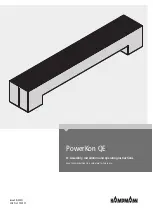
Page 36
Condensate Piping
This unit is designed for either right- or left-side exit of
condensate piping in up flow applications. In horizontal
applications, the condensate trap must extend below the
unit. An 8” service clearance is required for the conden
-
sate trap. Refer to FIGURE 45 and FIGURE 47 for con
-
densate trap locations. FIGURE 53 shows trap assembly
using 1/2” PVC or 3/4” PVC.
NOTE -
If necessary the condensate trap may be installed
up to 5’ away from the furnace. Use PVC pipe to connect
trap to furnace condensate outlet. Piping from furnace
must slope down a minimum of 1/4” per ft. toward trap.
1 -
Determine which side condensate piping will exit
the unit, location of trap, field-provided fittings and
length of PVC pipe required to reach available drain.
NOTE -
Do not remove the rubber grommet used to
seal the cabinet on the side not used when installing
the condensate trap.
2 -
Use a large flat head screw driver or a 1/2” drive
socket extension and remove plug (figure 45) from
the cold end header box at the appropriate location
on the side of the unit. Install provided 3/4 NPT
street elbow fitting into cold end header box. Use
Teflon tape or appropriate pipe dope.
NOTE -
Cold end header box drain plugs are factory
installed. Check the unused plug for tightness to
prevent leakage.
3 -
Install the cap over the clean out opening at the
base of the trap. Secure with clamp. See FIGURE
53.
4 - Install drain trap using appropriate PVC fittings,
glue all joints. Glue the provided drain trap as
shown in FIGURE 53. Route the condensate line
to an open drain. Condensate line must maintain a
1/4” downward slope from the furnace to the drain.
5 - Figures 48 and 50 show the furnace and evaporator
coil using a separate drain. If necessary the
condensate line from the furnace and evaporator
coil can drain together. See FIGURE 49, FIGURE
51 and FIGURE 52.
CONDENSATE TRAP AND PLUG LOCATIONS
(Unit shown in upflow position)
NOTE - In upflow applications where side return
sate trap, filter rack must be installed beyond
condensate trap or trap must be re-located to
avoid interference.
Trap
(same on
right side)
Plug
(same on left side)
1-1/2 in.
FIGURE 45
Upflow furnace (FIGURE 51)
- In upflow furnace appli
-
cations the field provided vent must be a minimum 1”
to a maximum 2” length above the condensate drain
outlet connection. Any length above 2” may result in a
flooded heat exchanger if the combined primary drain
line were to become restricted.
Horizontal furnace (FIGURE 52)
- In horizontal furnace
applications the field provided vent must be a minimum
4” to a maximum 5” length above the condensate drain
outlet connection. Any length above 5” may result in a
flooded heat exchanger if the combined primary drain
line were to become restricted.
NOTE -
In horizontal applications it is recommended
to install a secondary drain pan underneath the unit
and trap assembly.
NOTE -
Appropriately sized tubing and barbed fitting
may be used for condensate drain. Attach to the
drain on the trap using a hose clamp. See FIGURE
46.
6 - If unit will be started immediately upon completion
of installation,prime trap per procedure outlined in
Unit Start- Up section.
Field Provided Drain Components
Tubing
Hose Clamp
Barbed Fitting
Elbow
FIGURE 46
CAUTION
Do not use copper tubing or existing copper condensate
lines for drain line.
Condensate line must slope downward away from the trap
to drain. If drain level is above condensate trap, conden
-
sate pump must be used. Condensate drain line should
be routed within the conditioned space to avoid freezing
of condensate and blockage of drain line. If this is not pos
-
sible, a heat cable kit may be used on the condensate
trap and line. Heating cable kit is available from Lennox
in various lengths; 6 ft. (1.8m) - kit no. 26K68 and 24 ft.
(7.3m) - kit no. 26K69.
















































